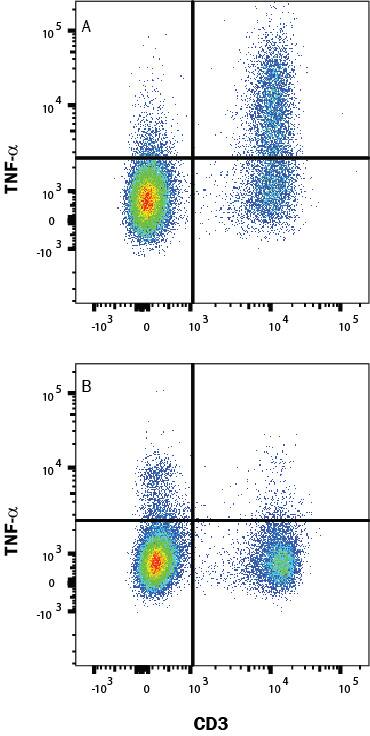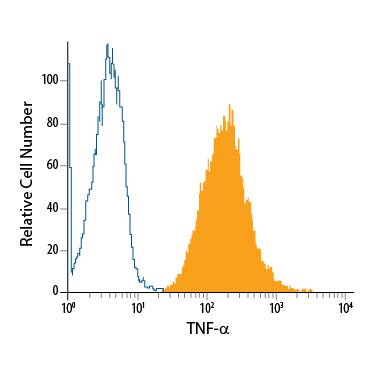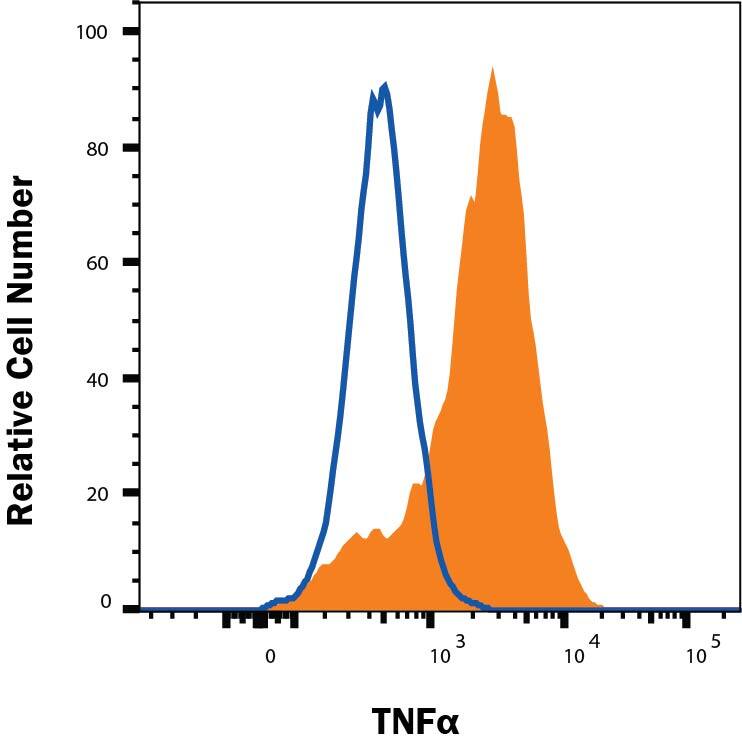Mouse TNF-alpha PE-conjugated Antibody
R&D Systems, part of Bio-Techne | Catalog # IC410P


Conjugate
Catalog #
Key Product Details
Validated by
Biological Validation
Species Reactivity
Validated:
Mouse
Cited:
Mouse
Applications
Validated:
Intracellular Staining by Flow Cytometry
Cited:
Flow Cytometry
Label
Phycoerythrin (Excitation = 488 nm, Emission = 565-605 nm)
Antibody Source
Monoclonal Rat IgG1 Clone # MP6-XT22
Product Specifications
Immunogen
Mouse TNF-alpha
Specificity
Detects mouse TNF-alpha in flow cytometry.
Clonality
Monoclonal
Host
Rat
Isotype
IgG1
Scientific Data Images for Mouse TNF-alpha PE-conjugated Antibody
Detection of TNF-alpha in Mouse Splenocytes by Flow Cytometry.
Mouse splenocytes (A) treated with PMA (50 ng/mL), Ca2+ Ionomycin (200 ng/mL) and Brefeldin A (5 μg/mL) for 4 hours or (B) untreated, were stained with Rat Anti-Mouse TNF-alpha PE-conjugated Monoclonal Antibody (Catalog # IC410P) and Rat anti-Mouse CD3 APC-conjugated Monoclonal Antibody (FAB4841A). Quadrant markers were set based on isotype control antibody (IC005P). To facilitate intracellular staining, cells were fixed with Flow Cytometry Fixation Buffer (FC004) and permeabilized with Flow Cytometry Permeabilization/Wash Buffer I (FC005). Staining was performed using our protocol for Staining Intracellular Molecules.Detection of TNF-alpha in EL-4 Mouse Cell Line by Flow Cytometry.
EL-4 mouse lymphoblast cell line treated with anti-CD3/anti-CD28, PMA, and Calcium Ionomycin was stained with Rat Anti-Mouse TNF-a PE-conjugated Monoclonal Antibody (Catalog # IC410P, filled histogram) or isotype control antibody (Catalog # IC005P, open histogram). To facilitate intracellular staining, cells were fixed with Flow Cytometry Fixation Buffer (FC004) and permeabilized with Flow Cytometry Permeabilization/Wash Buffer I (FC005). View our protocol for Staining Intracellular Molecules.Detection of TNF-alpha in Raw264.7 cells by Flow Cytometry.
Raw264.7 cells were stained with Rat Anti-Mouse TNF-alpha PE-conjugated Monoclonal Antibody (Catalog # IC410P, filled histogram) or isotype control antibody (Catalog # IC005P, open histogram). To facilitate intracellular staining, cells were fixed with FC012 and permeabilized with FoxP3 Perm. View our protocol for Staining Intracellular Molecules.Applications for Mouse TNF-alpha PE-conjugated Antibody
Application
Recommended Usage
Intracellular Staining by Flow Cytometry
10 µL/106 cells
Sample: EL‑4 mouse lymphoblast cell line treated with anti-CD3/anti-CD28, PMA, Calcium Ionomycin and mouse splenocytes treated with PMA and Ca2+ ionomycin fixed with Flow Cytometry Fixation Buffer (Catalog # FC004) and permeabilized with Flow Cytometry Permeabilization/Wash Buffer I (Catalog # FC005), and RAW 264.7 mouse monocyte/macrophage cell line
Sample: EL‑4 mouse lymphoblast cell line treated with anti-CD3/anti-CD28, PMA, Calcium Ionomycin and mouse splenocytes treated with PMA and Ca2+ ionomycin fixed with Flow Cytometry Fixation Buffer (Catalog # FC004) and permeabilized with Flow Cytometry Permeabilization/Wash Buffer I (Catalog # FC005), and RAW 264.7 mouse monocyte/macrophage cell line
Formulation, Preparation, and Storage
Purification
Protein A or G purified from hybridoma culture supernatant
Formulation
Supplied in a saline solution containing BSA and Sodium Azide.
Shipping
The product is shipped with polar packs. Upon receipt, store it immediately at the temperature recommended below.
Stability & Storage
Store the unopened product at 2 - 8° C. Do not use past expiration date. Protect from light.
Background: TNF-alpha
Long Name
Tumor Necrosis Factor alpha
Alternate Names
Cachetin, DIF, TNF, TNF-A, TNFA, TNFalpha, TNFG1F, TNFSF1A, TNFSF2
Entrez Gene IDs
Gene Symbol
TNF
Additional TNF-alpha Products
Product Documents for Mouse TNF-alpha PE-conjugated Antibody
Product Specific Notices for Mouse TNF-alpha PE-conjugated Antibody
For research use only
